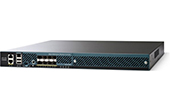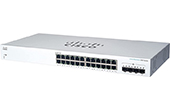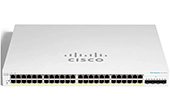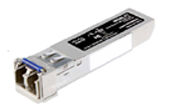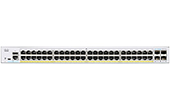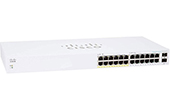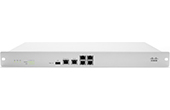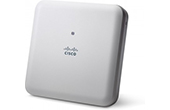2 Port Phone Adapter Cisco SPA112
- The Cisco SPA112 2 Port Adapter enables high-quality VoIP service with a comprehensive feature set through a broadband Internet connection. Easy to install and use, it works over an IP network to connect analog phones and fax machines to a VoIP service provider and provides support for additional LAN connections.
- The Cisco SPA112 includes two standard telephone ports to connect existing analog phones or fax machines to a VoIP service provider. Each phone line can be configured independently. With the Cisco SPA112, users can protect and extend their investment in their existing analog telephones, conference speakerphones, and fax machines as well as control their migration to IP voice with an extremely affordable, reliable solution.
- Compact in design and compatible with international voice and data standards, the Cisco SPA112 can be used with residential, home-office, and small business VoIP service offerings, including full-featured hosted or open source IP PBX environments. This easy-to-use solution delivers advanced features to better connect employees and serve customers, all on a highly secure Cisco network.
- Enables high-quality VoIP service with a comprehensive feature set through a broadband Internet connection
- Provides high-quality, clear-sounding voice, using advanced voice quality-of-service (QoS) capabilities and the industry-leading voice Session Initiation Protocol (SIP) stack
- Supports reliable faxing with simultaneous voice and data use
- Includes two standard telephone ports, each with an independent phone number, for use with fax machines or analog phone devices
- Is compatible with all industry voice and data standards and common telephone features such as caller ID, call waiting, and voicemail
- Includes a simple-to-use web-based configuration utility for easy deployment
Toll-quality voice and carrier-class feature support: The Cisco SPA112 delivers clear, high-quality voice communication under a variety of network conditions. Excellent voice quality in challenging, changeable IP network environments is made possible through the advanced implementation of standard voice coding algorithms. The Cisco SPA112 is interoperable with common telephony equipment such as fax, voicemail, private branch exchanges (PBXs) and key telephone systems (KTSs), and interactive voice response systems.
Large-scale deployment and management: The Cisco SPA112 enables service providers to provide customized services to their subscribers. It can be remotely provisioned and supports dynamic, in-service software upgrades. A highly secure profile upload saves providers the time and expense of managing and preconfiguring or reconfiguring customer premises equipment (CPE) for deployment.
Outstanding security: The Cisco SPA112 supports highly secure, encryption-based methods for communication, provisioning, and servicing.
Compact size: Designed for small spaces, the Cisco SPA112 can be installed as a desktop unit or mounted on a wall.
Comprehensive feature set: The standards-based Cisco SPA112 is compatible with Internet VoIP provider features such as caller ID, call waiting, voicemail, call forwarding, distinctive ring, and much more to provide a complete, affordable, and highly reliable solution for high-quality VoIP.
Easy installation and changes: The web-based configuration utility enables quick deployment and easy changes.
|
Specifications |
Description |
|
Data networking |
MAC address (IEEE 802.3) |
|
IPv4 (RFC 791) upgradeable to IPv6 (RFC 1883) |
|
|
Address Resolution Protocol (ARP) |
|
|
Domain Name System (DNS) A record (RFC 1706) and SRV record (RFC 2782) |
|
|
Dynamic Host Configuration Protocol (DHCP) client (RFC 2131) |
|
|
Point-to-Point Protocol over Ethernet (PPoE) client (RFC 2516) |
|
|
Internet Control Message Protocol (ICMP) (RFC 792) |
|
|
TCP (RFC 793) |
|
|
User Datagram Protocol (UDP) (RFC 768) |
|
|
Real Time Protocol (RTP) (RFC 1889) (RFC 1890) |
|
|
Real Time Control Protocol (RTCP) (RFC 1889) |
|
|
VLAN tagging (IEEE 802.1p) |
|
|
Simple Network Time Protocol (SNTP) (RFC 2030) |
|
|
SIP channels support for both UDP and TCP transport |
|
|
Voice gateway |
SIPv2 (RFC 3261, 3262, 3263, and 3264) |
|
SIP proxy redundancy: Dynamic through use of DNS SRV A records |
|
|
Reregistration with primary SIP proxy server |
|
|
SIP support in network address translation (NAT) networks (including Serial Tunnel [STUN]) |
|
|
Highly secure (encrypted) calling using Secure RTP (SRTP) |
|
|
Codec name assignment |
|
|
G.711 (A-law and μ-law) |
|
|
G.726 (32 kbps) |
|
|
G.729 A |
|
|
Dynamic payload |
|
|
Adjustable audio frames per packet |
|
|
Dual-tone multifrequency (DTMF): In-band and out-of-band (RFC 2833) (SIP information) |
|
|
Voice features |
Independent configurable dial plans with interdigit timers and IP dialing (1 per port) |
|
Call progress tone generation |
|
|
Jitter buffer: Adaptive |
|
|
Frame loss concealment |
|
|
Full-duplex audio |
|
|
Echo cancellation (G.165 and G.168) |
|
|
Voice activity detection (VAD) |
|
|
Silence suppression |
|
|
Comfort noise generation (CNG) |
|
|
Attenuation and gain adjustments |
|
|
Flash hook timer |
|
|
Message waiting indicator (MWI) tones |
|
|
Visual messaging waiting indicator (VMWI) using frequency shift keying (FSK) |
|
|
Polarity control |
|
|
Hook flash event signaling |
|
|
Caller ID generation (name and number): Bellcore, DTMF, and European Telecommunications Standards Institute (ETSI) |
|
|
Streaming audio server: Up to 10 sessions |
|
|
Music on hold |
|
|
Call waiting, call waiting and caller ID |
|
|
Caller ID with name and number |
|
|
Caller ID blocking |
|
|
Selective and anonymous call rejection |
|
|
Call forwarding: No answer, busy, and all |
|
|
Do not disturb |
|
|
Call transfer, call return, and call back on busy |
|
|
Three-way conference calling with local mixing |
|
|
Per-call authentication and associated routing |
|
|
Call blocking with toll restriction |
|
|
Distinctive ringing: Calling and called number |
|
|
Off-hook warning tone |
|
|
Advanced inbound and outbound call routing |
|
|
Hotline and warmline calling |
|
|
Long silence (configurable time setting) silence threshold |
|
|
Disconnect tone (for example, reorder tone) |
|
|
Configurable ring frequency |
|
|
Ring validation time setting |
|
|
Tip and ring voltage adjustment setting |
|
|
Ring indication delay setting |
|
|
Fax capability |
Fax tone detection pass-through |
|
Fax pass-through using G.711 |
|
|
Real-time fax over IP using T.38 fax relay (T.38 support is dependent on fax machine and network and transport resilience) |
|
|
Security |
Password-protected system reset to factory default |
|
Password-protected administrator and user access authority |
|
|
Provisioning, configuration, and authentication |
|
|
HTTPS with factory-installed client certificate |
|
|
HTTP digest: Encrypted authentication using MD5 (RFC 1321) |
|
|
Up to 256-bit Advanced Encryption Standard (AES) encryption |
|
|
SIP Transport Layer Security (TLS) |
|
|
Provisioning, administration, and maintenance |
Web browser administration and configuration using integral web server |
|
Telephone keypad configuration with interactive voice prompts |
|
|
Automated provisioning and upgrade using HTTPS, HTTP, and Trivial File Transfer Protocol (TFTP) |
|
|
TR-069 |
|
|
Asynchronous notification of upgrade availability using Notify |
|
|
Nonintrusive, in-service upgrades |
|
|
Report generation and event logging |
|
|
Statistics in Bye message |
|
|
Debug server records and syslog: Per-line configurable web browser |
|
|
Ping and traceroute diagnostics |
|
|
Configuration management: Backup and restore |
|
|
Support for Bonjour |
|
|
Physical interfaces |
1 WAN 100BASE-T RJ-45 Ethernet Port (IEEE 802.3) |
|
2 RJ-11 FXS phone ports for analog circuit telephone device (tip and ring) |
|
|
Reset button |
|
|
Subscriber line interface circuit (SLIC) |
Ring voltage: 40-90 Vpk configurable |
|
Ring frequency: 20-25 Hz |
|
|
Ring waveform: trapezoidal |
|
|
Maximum ringer load: 5 ringer equivalence numbers (RENs) |
|
|
On-hook voltage (tip and ring): -46 to -56V |
|
|
Off-hook current: 18-25 mA |
|
|
Terminating impedance: 600 ohm resistive or 270 ohm + 750 ohm |
|
|
150 nF complex impedance |
|
|
Frequency response: 300-3400 Hz |
|
|
Return loss (600 ohm, 300-3400 Hz): up to 20 dB |
|
|
Insertion loss (1 Vrms at 1 kHz): 3-4 dB |
|
|
Total harmonic distortion (THD) (350 mV peak at 300 Hz): up to 3% |
|
|
Idle channel noise: 72 dB (typical) |
|
|
Longitudinal balance: 55 dB (typical) |
|
|
Off-hook threshold (line seizure): Rdc < 1000 ohm |
|
|
On-hook threshold (line release): Rdc >10000 ohm |
|
|
Rdc DC supervisory range: Rdc > 450 ohm |
|
|
Regulatory compliance |
FCC (Part 15 Class B), CE, ICES-003, A-Tick certification, Restriction of Hazardous Substances (RoHS), and UL |
|
Power supply |
DC input voltage: 5V DC at 2.0A maximum |
|
Power consumption: 5W |
|
|
Switching type (100-240V) automatic |
|
|
Power adapter: 100-240V and 50-60 Hz (26-34 VA) AC input, with 1.8m cord |
|
|
Indicator lights and LEDs |
Phone 1, phone 2, Internet, and power |
|
Dimensions (W x H x D) |
3.98 x 3.98 x 1.10 in. (101 x 101 x 28 mm) |
|
Unit weight |
5.40 oz (153 g) |
|
Operating temperature |
32 to 113ºF (0 to 45ºC) |
- Bảo hành: 12 tháng.








